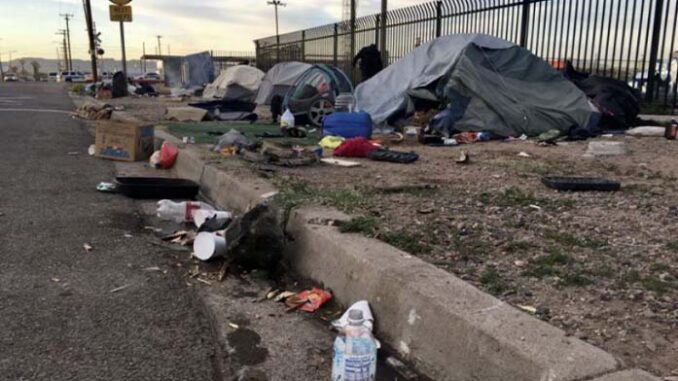
The Phoenix City Council banned camping during its regular meeting last week in a unanimous vote.
Currently, city ordinance bans camping on parks and preserves; buildings, facilities, parking lots, and structures; and all property owned, possessed, or controlled by the city. During Wednesday’s meeting, the city added language prohibiting camping within 500 feet of the property boundary of a school, child care facility, shelter, or city-owned park. Penalties for violating the camping bans would be class three misdemeanors and a fine not exceeding $1,000.
The Office of Homeless Solutions will lead on connecting the homeless attempting to camp with services.
The ordinance will go into effect on Sept. 1, a future date picked to await the Supreme Court’s ruling on the issue (see: Oregon v. Johnson).
Councilmember Ann O’Brien, the driving force behind the camping ban, said that she learned through her listening tours that the I-17 corridor communities were concerned about their children’s safety due to the homeless masses openly doing drugs. O’Brien reported that her proposed plan inspired by other cities’ actions to mitigate homelessness had yielded an 18 percent decline to levels of homeless not seen since 2018.
Public comment featured several members of the homeless community. One woman, Elena on behalf of the Houseless Leadership Project, said it was the government’s fault that they didn’t have housing.
“If we honestly had better housing and got a lot more help on housing, we wouldn’t be sleeping on the streets and stuff like that,” said Elena.
A man, Henny, said the homeless don’t feel as safe in homeless shelters and halfway houses as they do on the streets, and that the city was neglecting other problems like crime.
“Some of the stuff I heard today sounds good, y’all trying to open up a lot of spaces for us, open doors, but we all know that that’s not really helping. Still going to be the same problems, same trouble in the neighborhood, same problem with the law,” said Henny. “If you really want to help some of us people on the streets, change how you people talk to us.”
A volunteer with Fund for Empowerment and self-identified formerly homeless woman, Faith, said the city’s plan to use law enforcement wouldn’t work.
Another volunteer with Fund for Empowerment and formerly homeless man, Frank, concurred that arresting and forcing the homeless to leave wouldn’t work. Frank said that the city needed to provide personalized shelter spaces for each homeless individual.
Unlike the homeless, taxpaying citizens expressed strong support for the camping ban.
One man, Brandon, said that the homeless plaguing the streets with their encampments were part of a “select group” that have repeatedly refused city and nonprofit services while violating laws.
“People have the right to be homeless, but they don’t have the right to be a nuisance or a burden to the rest of us,” said Brandon.
Another man, Cory, attested that he works adjacent to Margaret T. Hance park and that his offices have been plagued by homeless antics: urination and defecation, break-ins, wall climbing, and threatening staff members.
A woman, Sandra, said that the camping bans were important for not only aesthetics but the health and safety of the community.
Councilmember Jim Waring attested that San Diego, California’s camping ban caused the area to go from a dangerous place where none other than homeless existed to a clean one, marked by single female joggers and dog walkers.
“We can’t build tens to hundreds of millions of dollars of infrastructure for our citizens and then they don’t want to use it because of the behavior of 7,000 people, or some of those 7,000 people, is making it just an uncomfortable experience,” said Waring.
Waring pointed out that there were 14 dead bodies discovered in Phoenix parks over a 6 or 7 month period, some reportedly discovered by mothers with their children.
“Ultimately, it’s not even a question of right and wrong, we simply can’t have people living the way they’re living. It’s gotten out of hand,” said Waring. “The whole point of having a government is so that people aren’t living in filth, so that there’s some sort of rule of law, there’s something to hold it together.”
